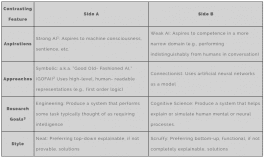IP-AI • JUNE 6
Cultural Computing/Indigenous Values

Dr D. Fox Harrell & Danielle Olson attended the March 2019 Indigenous Protocol and Artificial Intelligence workshops in Hawai’i. Here they share their thoughts detailing how all technology systems, including Artificial Intelligence, are cultural systems.
Artificial intelligence (AI) systems are cultural systems. This may not seem intuitive for those who think of them as complex, technologies serving utilitarian purposes. However, “all technical systems are cultural systems.” (Harrell, Phantasmal Media, p. 345). This is because technologies are created in particular historical-cultural contexts and are informed by underlying shared cultural perspectives. Furthermore, computers play a role in shaping culture “through facilitating the construction of shared knowledge, share beliefs, and shared representations” (Harrell, 2013, p. 345). When considering the future of AI, particularly the relationship between a plurality of Indigenous values and AI, we need to then make some of the values within AI explicit that are usually left implicit. Toward this end, it is first useful to consider what AI itself is — and we quickly begin to see that AI itself represents a plurality of values as well. AI represents many different aims, technologies, approaches, and communities of practice. Often times, these aspects are described in binary terms, for instance contrasting:

2. Haugeland, 1985
3. Jenson, 2018
“Furthermore, computers play a role in shaping culture “through facilitating the construction of shared knowledge, share beliefs, and shared representations”
Support for AI has gone through cycles as well. Early on, AI researchers worked on abstract, small domains with the belief that the results would generalize to the world at large — with a swath of research impelled by military-industrial applications. The mid-1970s have been described as an “AI winter,” particularly in the United States as the Defense Advanced Research Projects Agency (DARPA) funding policy changed in a way that disadvantaged generalized AI research. Recently, with the processing power of today’s computers, pervasiveness of big data, and new innovations and optimizations with artificial neural networks, “deep learning” approaches have produced compelling results. The attendant attention and funding AI have prompted some to even suggest we are now in an “AI spring” (Warren, 2016).
In light of these many aspirations, aims, approaches, research goals, and styles of AI, one might ask: how might we begin to characterize the values within traditions of AI? The concept of an “integrative cultural system” helps toward this end. The term “integrative cultural system” can be used to describe how cultural, knowledge, beliefs, and representations are distributed onto material and conceptual artifacts, here with a focus on computational artifacts (Harrell, 2013, p. 207-249). We need to carefully examine the assumptions, structures, uses, discourse around, and practices involving these technologies. This means that we should not limit ourselves to analyzing the technical functionality of systems, but rather looking at the ecologies of people, artifacts, code, interfaces, language, etc. around systems in a more holistic way (Harrell, 2013, p. 74).
“How might we begin to characterize the values within traditions of AI? The concept of an “integrative cultural system” helps toward this end.”
Finally, to engage the relationship between Indigenous cultures and AI in a manner that supports people’s empowering needs and values, we need to adopt a cultural computing perspective (Harrell, 2013, p. 167). This perspective entails performing research and practices that engage commonly excluded cultural values and activities to spur socially and critically valuable computational innovation. More importantly, cultural computing research and practice focuses on rigorously understanding and articulating the groundings of computing systems in culture. This all means that we must work together to build the future of AI in a manner that supports the vast array of human creative cultural production, including supporting mental and physical wellness, economic and educational advancement (U.S. Global Development Lab, 2018), the arts, and more. We hope that this workshop can help open new vistas based on grounding computational practices in Indigenous values that have long traditions of supporting such ends.
Author Bios:
Dr. D. Fox Harrell, Ph.D., is Professor of Digital Media at MIT in both the Computer Science & Artificial Intelligence Laboratory and Comparative Media Studies Program. He is also the Director of both the MIT Centre for Advanced Virtuality and the MIT Imagination, Computation, and Expression Laboratory.
Danielle Olson, S.M., is a Ph.D. student at MIT in the Computer Science & Artificial Intelligence Laboratory and Research Assistant in the Imagination, Computation, & Expression Laboratory (ICE Lab). Danielle researches strategies for embodied race and ethnicity representation in virtual reality (VR).
The Indigenous Protocols and Artificial Intelligence (IP-AI) workshops are founded by Old Ways, New, and the Initiative for Indigenous Futures. This work is funded by the Canadian Institute for Advanced Research (CIFAR), Old Ways, New, the Social Sciences and Humanities Research Council (SSHRC) and the Concordia University Research Chair in Computational Media and the Indigenous Future Imaginary.
IP-AI • JUNE 6
Cultural Computing/Indigenous Values

Dr D. Fox Harrell & Danielle Olson attended the March 2019 Indigenous Protocol and Artificial Intelligence workshops in Hawai’i. Here they share their thoughts detailing how all technology systems, including Artificial Intelligence, are cultural systems.
Artificial intelligence (AI) systems are cultural systems. This may not seem intuitive for those who think of them as complex, technologies serving utilitarian purposes. However, “all technical systems are cultural systems.” (Harrell, Phantasmal Media, p. 345). This is because technologies are created in particular historical-cultural contexts and are informed by underlying shared cultural perspectives. Furthermore, computers play a role in shaping culture “through facilitating the construction of shared knowledge, share beliefs, and shared representations” (Harrell, 2013, p. 345). When considering the future of AI, particularly the relationship between a plurality of Indigenous values and AI, we need to then make some of the values within AI explicit that are usually left implicit. Toward this end, it is first useful to consider what AI itself is — and we quickly begin to see that AI itself represents a plurality of values as well. AI represents many different aims, technologies, approaches, and communities of practice. Often times, these aspects are described in binary terms, for instance contrasting:

2. Haugeland, 1985
3. Jenson, 2018
“Furthermore, computers play a role in shaping culture “through facilitating the construction of shared knowledge, share beliefs, and shared representations”
Support for AI has gone through cycles as well. Early on, AI researchers worked on abstract, small domains with the belief that the results would generalize to the world at large — with a swath of research impelled by military-industrial applications. The mid-1970s have been described as an “AI winter,” particularly in the United States as the Defense Advanced Research Projects Agency (DARPA) funding policy changed in a way that disadvantaged generalized AI research. Recently, with the processing power of today’s computers, pervasiveness of big data, and new innovations and optimizations with artificial neural networks, “deep learning” approaches have produced compelling results. The attendant attention and funding AI have prompted some to even suggest we are now in an “AI spring” (Warren, 2016).
In light of these many aspirations, aims, approaches, research goals, and styles of AI, one might ask: how might we begin to characterize the values within traditions of AI? The concept of an “integrative cultural system” helps toward this end. The term “integrative cultural system” can be used to describe how cultural, knowledge, beliefs, and representations are distributed onto material and conceptual artifacts, here with a focus on computational artifacts (Harrell, 2013, p. 207-249). We need to carefully examine the assumptions, structures, uses, discourse around, and practices involving these technologies. This means that we should not limit ourselves to analyzing the technical functionality of systems, but rather looking at the ecologies of people, artifacts, code, interfaces, language, etc. around systems in a more holistic way (Harrell, 2013, p. 74).
“How might we begin to characterize the values within traditions of AI? The concept of an “integrative cultural system” helps toward this end.”
Finally, to engage the relationship between Indigenous cultures and AI in a manner that supports people’s empowering needs and values, we need to adopt a cultural computing perspective (Harrell, 2013, p. 167). This perspective entails performing research and practices that engage commonly excluded cultural values and activities to spur socially and critically valuable computational innovation. More importantly, cultural computing research and practice focuses on rigorously understanding and articulating the groundings of computing systems in culture. This all means that we must work together to build the future of AI in a manner that supports the vast array of human creative cultural production, including supporting mental and physical wellness, economic and educational advancement (U.S. Global Development Lab, 2018), the arts, and more. We hope that this workshop can help open new vistas based on grounding computational practices in Indigenous values that have long traditions of supporting such ends.
Author Bios:
Dr. D. Fox Harrell, Ph.D., is Professor of Digital Media at MIT in both the Computer Science & Artificial Intelligence Laboratory and Comparative Media Studies Program. He is also the Director of both the MIT Centre for Advanced Virtuality and the MIT Imagination, Computation, and Expression Laboratory.
Danielle Olson, S.M., is a Ph.D. student at MIT in the Computer Science & Artificial Intelligence Laboratory and Research Assistant in the Imagination, Computation, & Expression Laboratory (ICE Lab). Danielle researches strategies for embodied race and ethnicity representation in virtual reality (VR).
The Indigenous Protocols and Artificial Intelligence (IP-AI) workshops are founded by Old Ways, New, and the Initiative for Indigenous Futures. This work is funded by the Canadian Institute for Advanced Research (CIFAR), Old Ways, New, the Social Sciences and Humanities Research Council (SSHRC) and the Concordia University Research Chair in Computational Media and the Indigenous Future Imaginary.